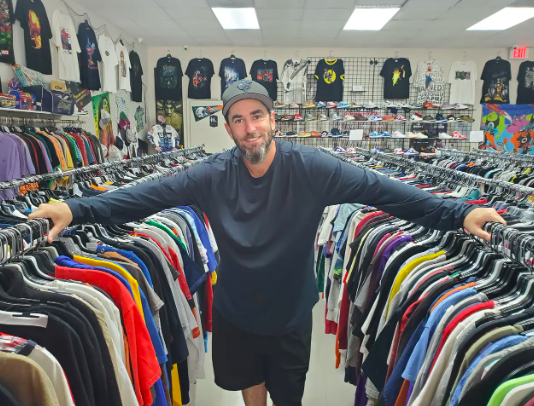10 top sports VCs and other investors share their best advice for startups

- It’s been a rough year for startups looking to raise money, especially in sports gambling.
- Insider compiled a list of the top venture capital investors pouring money into sports.
- Leaders of 10 VC firms offered advice for sports startups trying to fundraise in a tough market.
The startup scene in 2023 is depressing. Tom Loverro, an investor, described it as a “mass extinction event for startups.”
A drop in funding over the last two years has prompted some startup founders to abandon venture capital in favor of bootstrapping their businesses.
In the sports world, betting and gambling startups have started raising fewer and fewer funding dollars over the last two years.
While funding is becoming more difficult to obtain, startups are also experiencing changes in the worlds of sports business and technology. Consider esports, sports betting, and youth sports. Consider artificial intelligence, streaming, and social media. Consider how a new generation of fans is changing the way audiences watch and interact with sports.
“I think we’re entering a new cycle for our industry in general,” Cole Van Nice of Elysian Park, a sports investment firm, told Insider. He predicts continued growth in sports-related health, culture, commerce, and technology, as well as “a wave of consolidation” in which specific technologies merge into larger platforms.
Insider recently published a list of the top venture capital firms investing in sports and asked their founders, CEOs, partners, and directors what advice they would give to startups looking to break into the industry.
In alphabetical order by firm name, here is the advice sports venture capital leaders give to startups looking to raise money in the coming years:
Chris Grove, Acies Investments, EKG Ventures cofounder and partner: Change your timetable.
Acies Investments and EKG Ventures are key investors in sports, gambling, and technology.
His advice to fundraisers: Expect it to take longer than you think, especially if you’ve previously raised funds. Everyone is moving more slowly. Due diligence is more extensive than it was a year or two ago. There’s also less competition for deals than there was a year or two ago, so budget for an extra buffer to get commitments and funding.
Deepen Parikh, cofounder and partner, Courtside Ventures: Have a good story
Courtside, a sports, lifestyle, and gaming investment firm founded in 2016, has backed Tom Brady and Michael Strahan’s media company Religion of Sports, Veo, a subscription platform for youth sports, and Mojo, a sports betting platform, among others.
His fundraising advice: Because we are a very founder-centric fund, storytelling is extremely important. The ability to address a large addressable market is also important. Because we are a thematic fund, people frequently consider how to solve a specific use case; we are looking for fund-returning potential.
Some say it’s best to find a warm introduction; while this is true, one of our largest investments came in cold. The timing was perfect, and it was a location we were very familiar with. It didn’t hurt that they were growing at a rapid pace. We examine everything.
Meredith McPherron, CEO of DraftKings: Gather proprietary data in order to compete.
Since its inception in October 2021, the VC firm has invested in 19 sports and gaming, fandom, and human-performance startups, including Alex Rodriguez’s ticketing startup Jump.
Her advice to startups seeking funding: Make a plan to collect proprietary data, which is required to compete in the world of sports technology.
Raise 24 months’ worth of cash at a reasonable price. Build a core A-team capable of attracting more A+ talent, as investors view high-quality teams as a risk mitigator for large bets.
Understand what is driving value and challenging convention in your industry. And have a strategy in place to acquire customers in a unique way. It will demonstrate discipline and thoughtfulness, as well as instill confidence in both investors and team members.
Cole Van Nice, cofounder and managing partner, Elysian Park Ventures: Grab the industry’s attention with a fresh idea
Key investments: The firm focuses on sports and sports-related investments, such as Arena Club, a collectibles marketplace, Diamond Kinetics, a baseball and softball technology company, and Splash Sports, a gaming platform. In collaboration with the PGA of America and Topgolf Callaway, Elysian Park Ventures established a fund specifically to invest in golf over the last year.
How to Succeed in Sports: Do something that requires little capital but captures the attention of the sports industry — something in health, culture, commerce, or technology that establishes you as a new voice worth listening to. Believe us when we say that this industry is looking for new voices because the old ones are running out of answers.
Brad Farkas, HBSE Ventures co-founder and general partner: Save money — the quickest way to fail is to run out of it.
HBSE has made approximately 20 investments in sports and sports-related areas such as entertainment, sports betting, and exercise, including Buzzer, a sports content app; Swoops, an NFT-based fantasy basketball game; and Anzu, a video game programmatic ad platform.
How to Survive in a Tough Environment: We advise all of our early stage companies to manage their cash carefully and to limit their run rates. There will be no national advertising campaigns, speculative spending, or R&D that is not strategic and necessary. Running out of money is the quickest way for a business to fail.
And plan ahead of time to raise future rounds. You used to have three months to raise funds; now you have at least six months. Raise capital around valuation inflection points, such as winning an award or launching a new product.
KB Partners partners Steve Ahern and Lance Dietz: Keep customers in mind.
Important investments include: KB Partners, based in Chicago, invests at the intersection of sports and technology; its portfolio includes FanPower, a fan engagement company, GridRival, a fantasy platform for motorsports, and Stadium Live, an app for Gen Z fans.
They advise founders to build for customers or users rather than investors. We encourage founders to rapidly experiment and iterate on their product at the seed stage; to develop a deep understanding of the target user and how they interact with product features; to build a culture that can withstand the ups and downs of company building; and to keep an eye on unit economics as the company scales. These priorities can help founders get closer to the elusive goal of product-market fit, which can lead to more funding for the next stage of the business.
Craig Thompson, Mindspring Capital founder: Have a one-of-a-kind product that works.
Mindspring’s portfolio includes LIGR Live, a sports livestreaming company; Credenza, which uses blockchain to improve teams’ and athletes’ relationships with fans; and Pumpjack, a fan data platform.
What fundraisers should know: It’s a difficult time for raises; valuations are typically low. We have four criteria for investing in a technology company. The technology must be unique and solve an unsolved problem. It must either generate revenue or reduce costs. The technology must be simple and inexpensive to implement. And they must have case studies demonstrating that it works. They won’t have to worry about investors if they do this.
Michael Proman, Scrum Ventures managing director: Be adaptable.
Proman manages a sports and entertainment fund formed in December by Japanese venture capital firm Scrum Ventures. Boom Entertainment, which creates gaming products for sports and casino brands, and Tappp, which uses technology to place bets on-screen during live sports streams, are among its investments.
What he advises founders: It’s in their DNA, but the ability to make adjustments and be practical is essential. In sub-optimal market conditions, investors must step up and play a more active/supportive role, so make sure your cap-table includes partners who can do intangibles and GSD. If all you want is money, go to a bank or make friends with some wealthy people.
Wayne Kimmel, managing partner, SeventySix Capital: Concentrate on expanding your network.
Key investments: Since 2016, SeventySix has had a focus on sports technology and gaming. It has invested in 25 sports companies and sold four in the last few years, including sports betting broadcast and content company Vegas Sports Information Network, Inc., which was sold to DraftKings, and sports betting startup Vigtory, which was sold to FuboTV, now known as Fubo.
Entrepreneurs should strive to be experts and dynamic leaders, surround themselves with people smarter than them, and build a network in the sports, technology, and sports betting industries, according to his advice to founders.
Lloyd Danzig, managing partner, Sharp Alpha Advisors: Demonstrate to investors that you’re worth investing in.
Sharp Alpha Advisors focuses on sports, gaming, and entertainment, with investments ranging from the relaunched SlamBall league to the digital lottery company Jackpot.com.
His advice to fundraisers: It’s more important than ever to stand out and demonstrate to investors that you’re someone whose future earnings they want a stake in, regardless of what you’re building at the time.






